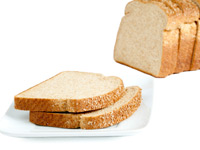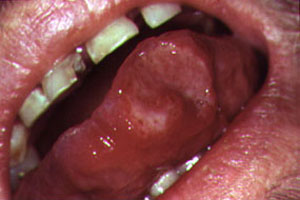There can be a number of reasons for getting frequent mouth ulcers, which are called Recurrent Aphthous Stomatitis (RAS). Some people are deficient in vitamin B, folic acid or iron, get irritations from acidic foods, suffer from mild physical trauma to the mouth (such as braces rubbing the inside of the cheek), or have a sensitivity to the sodium laurel sulfate (SLS) found in many toothpastes and mouthwashes. In some cases the cause may be your gut. If you are constantly plagued with canker sore outbreaks and you’ve searched in vain for a cause, it might be time to consider that you may have a gluten intolerance or sensitivity.
 Celiac disease is an immune disorder that affects the GI tract. Gluten, a type of protein found in wheat, rye and barley, can cause damage to the small intestine in those who are susceptible. When a person with an intolerance to gluten eats a food containing one of these grains, a variety of symptoms may occur, one of them is Recurrent Aphthous Stomatitis. In fact, of approximately 250 possible symptoms of celiac disease, most don’t manifest as GI symptoms at all.
Celiac disease is an immune disorder that affects the GI tract. Gluten, a type of protein found in wheat, rye and barley, can cause damage to the small intestine in those who are susceptible. When a person with an intolerance to gluten eats a food containing one of these grains, a variety of symptoms may occur, one of them is Recurrent Aphthous Stomatitis. In fact, of approximately 250 possible symptoms of celiac disease, most don’t manifest as GI symptoms at all.
Study Points to Gluten Intolerance
A study entitled “Gluten sensitivity enteropathy in patients with recurrent aphthous stomatitis” published in BMC Gastroenterology in 2009 found RAS may be the only outward sign of gluten intolerance. The researchers set out to learn how many patients with recurrent aphthous stomatitis had a gluten intolerance and they wanted to determine whether maintaining a gluten-free diet had an effect on the frequency and severity of mouth sores.
The study, conducted by Dr. Ramin Shakeri at the Tehran University of Medical Sciences in Iran, included 247 RAS patients who had a minimum of three canker sore episodes per year. The average age was 33 years old. The researchers screened the patients’ blood for certain antibodies and excluded those with negative tests. Out of the 247 people, seven patients tested positive on the blood tests. These patients were given intestinal biopsies and for all seven the findings indicated Gluten Sensitivity Enteropathy (GSE). None of the seven had responded positively to typical canker sore treatments or prescription topical corticosteroids, colchicine or tetracycline, which are sometimes used to treat tough cases. The researched recommended that these patients begin a gluten-free diet. Of the four who stuck to the diet, all showed a significant improvement in their mouth ulcers over a six-month period.
The researchers concluded that people suffering from RAS, especially those who have tried traditional treatments and did not respond well, should be tested for celiac disease.
Some people have suffered from frequent mouth sores all their life only later to discover it’s because they have celiac disease. A number of people who belatedly realized they suffered from celiac said they would get canker sores in clusters or clumps. Other common symptoms include cramping, gas, bloating, constipation, migraines, weight loss, fatigue, bone and joint pain. It can also lead to anemia because the body may have difficulty in absorbing vitamins, minerals and other nutrients.
If you are bothered with recurring mouth sores and you’ve tried every known treatment to no avail, it may be well worthwhile to have your doctor run a test for gluten sensitivity or intolerance. There is a simple lab test called an alpha-1-gliadin antibody assay that has been deemed the best method of diagnosing gluten sensitivity. It assesses the level of gluten antibodies in your blood or saliva.
Try a Gluten Free Diet
If you test positive, embarking on a gluten-free diet should help. Just what foods contain gluten? Popular foods include bread, cereals(including those with malt in their name), crackers, pizza, pasta, bagels, cookies, cakes and other pastries and even beer. Reading labels is a must, because some foods appear to be wheat-free yet still may contain gluten. For example, hydrolyzed vegetable protein, which is frequently found in products, is often made from wheat and therefore contains gluten. Grains that are generally safe to eat include amaranth, quinoa, teff, millet and sorghum. Spelt is a type of wheat and is not gluten-free. More and more gluten-free products are coming on the market that used gluten free ingredients, such as rice flour instead of wheat flour. You can even find gluten-free beer. The point is to read labels very carefully and look for additives that may contain gluten.
After a few months following this diet, you may see great improvement in canker sore episodes, as well as your overall health.
Resource: BMC Gastroenterology



